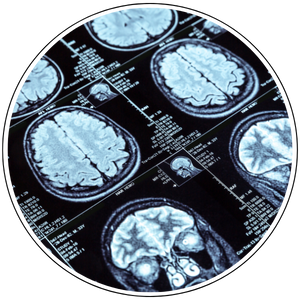STOPPING ALZHEIMER’S IN ITS TRACKS
Dr. Andrew Frank wants a future free from Alzheimer’s disease
 Currently, more than 55 million people have dementia worldwide according to the World Health Organization, with nearly 10 million new cases diagnosed each year.
Currently, more than 55 million people have dementia worldwide according to the World Health Organization, with nearly 10 million new cases diagnosed each year.
By 2030, over one million Canadians will be living with dementia. The majority of those dementia cases will be caused by Alzheimer’s disease, a neurodegenerative disorder that currently has no cure.
Dr. Andrew Frank, Investigator with the Bruyère Health Research Institute and cognitive neurologist with the Bruyère Health Memory Program, wants to see cutting edge treatments become a reality for patients.
Dementia and Alzheimer’s predominantly affect older adults, and as the population ages, more people will experience the memory loss, cognitive impairment, and loss of independence that come with these conditions.
“The brain is the center of our human experience, and its degeneration can be devastating, both to individuals and their families,” says Dr. Frank, who has seen firsthand how difficult a dementia diagnosis can be. “The promise of saving the brain is what drove me into the field of neurology and impassioned my work testing new medications for Alzheimer’s disease here at Bruyère Health for the past 16 years.”
A chance to treat Alzheimer’s in our lifetime
Alzheimer’s disease is the accumulation of toxic proteins in the brain, known as amyloid and tau. For decades, researchers have been developing and testing treatments that can remove amyloid from the brain.
Two clinical trials that are testing two new drug therapies are finally showing positive results.
Dr. Frank is among the research team that was testing one of these treatments, donanemab, here at Bruyère Health as part of the TRAILBLAZER-ALZ 2 randomized controlled clinical trial.
“For the first time, we are seeing that it is possible to slow the cognitive and functional decline of Alzheimer’s disease,” he shares. “And the research indicates that these treatments show more benefit for patients who are in the mildest stages of Alzheimer’s disease, which means we need to know someone is at risk as early as possible.”
How do we detect Alzheimer’s earlier?
 Alzheimer's disease begins years before the earliest symptoms start to show, and early symptoms are often mild enough that a person’s day-to-day life remains uninterrupted. That makes detection challenging.
Alzheimer's disease begins years before the earliest symptoms start to show, and early symptoms are often mild enough that a person’s day-to-day life remains uninterrupted. That makes detection challenging.
This is another critical piece of the puzzle for Dr. Frank, who is actively looking at the potential challenges Canada’s health care system needs to overcome if widespread treatments become available.
He is investigating recent advances in biomarkers, such as specialized blood tests, which may be key to detecting Alzheimer’s disease early. Unlike PET scans and lumbar punctures which are currently used for diagnosis, blood-based tests are cost-effective and can be made widely available for clinical use.
“With early detection and diagnosis, novel treatments may be able to prevent the destruction of dementia from affecting people in their lifetimes,” says Dr. Frank. “That means more time to spend with loved ones. That means more time building happy memories, which may be our most precious possessions of all.”